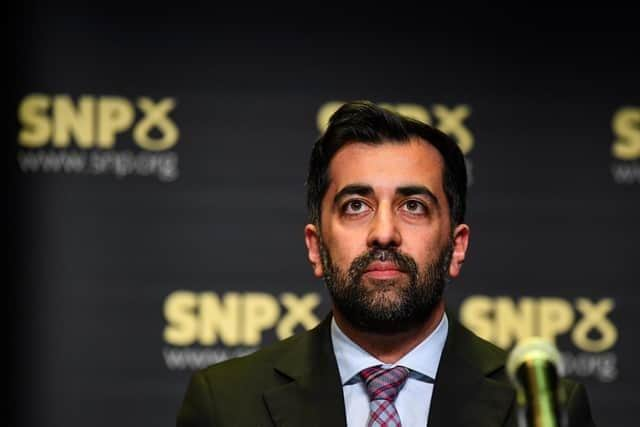Nicola Sturgeon resignation: One year on, Humza Yousaf has yet to escape former first minister's shadow, as polls show SNP decline
Nicola Sturgeon’s shock resignation one year ago today marked the start of one of the most difficult periods in the SNP’s nine-decade history.
First there was a bruising leadership election, in which Humza Yousaf, widely seen as the continuity candidate, scraped a victory over rival Kate Forbes.
Advertisement
Hide AdAdvertisement
Hide AdThen, just a few days after the new First Minister was formally sworn in, police swooped on the home of his predecessor and her husband, Peter Murrell.


The image of the blue tent erected by officers in the couple’s front garden on the outskirts of Glasgow was splashed over most national newspapers the following day.
The rug was immediately pulled from under Mr Yousaf’s feet. And there was more to come.
A fortnight later, as he prepared to set out his government’s priorities in Holyrood, another bombshell dropped. Colin Beattie, the SNP’s former treasurer, was arrested as part of the same police investigation into the party’s finances. He was later released without charge.
Ms Sturgeon herself was arrested and also released without charge a couple of months later. Operation Branchform – the name given to the police probe – is still ongoing.
These astonishing developments left Mr Yousaf stuck on the back foot, struggling to advance his own agenda.
In Holyrood, he was bombarded with questions from news-hungry journalists. His comments were not always helpful to the SNP. "Humza Yousaf: I don't believe the SNP is operating criminally," blared one headline.
Those around the First Minister pointed to his instinct to approach things head-on, rather than shying away from the media spotlight. But the unfolding drama was undeniably damaging.
Advertisement
Hide AdAdvertisement
Hide AdMark Diffley, a leading pollster, said the SNP has lost around 10 per cent of its support since Ms Sturgeon resigned. One in five of its former voters have switched to Labour.
Once in power, Mr Yousaf quickly ditched chunks of his predecessor’s policy agenda. A controversial consultation on alcohol advertising was sent back to the drawing board, while plans for highly protected marine areas were sunk beneath the waves.
Ms Sturgeon’s independence strategy was also axed. She had wanted to fight the next general election as a de-facto referendum.
At a special convention in June, Mr Yousaf steered through a new strategy “steeped in ambiguity and incoherence”, in the words of Professor James Mitchell, a prominent expert on the SNP. But the new First Minister had avoided a public spat with impatient activists, which was partly the aim.
“He has gone out of his way to try to bring folk together a bit more in the party,” said a source close to the First Minister. “He has certainly wanted to foster more of a kind of ‘Team SNP’ approach – making people feel they are a valued member of the team.”
Mr Yousaf’s leadership style is seen as more open and inclusive than that of his predecessor. Insiders say this “open-door policy” can also be demonstrated in his attempts to reset the Scottish Government’s relationship with business leaders.
A “New Deal for Business” was announced last year, while efforts have been made to reach out to figures such as Brian Souter, the controversial business tycoon and former SNP donor.
In October, Mr Yousaf used his first big SNP conference speech as leader to announce plans for a council tax freeze. This provoked an immediate backlash from cash-strapped council leaders, but those around the First Minister knew it would play well with the public.
Advertisement
Hide AdAdvertisement
Hide AdEarlier that month, the Nationalists had been spooked by a 20.4 per cent swing to Labour in the Rutherglen and Hamilton West by-election.
In truth, however, the standout image of the conference was the media scrum around Ms Sturgeon as she arrived at the venue in Aberdeen. She denied her presence overshadowed Mr Yousaf’s first conference in charge, but it was clear were the focus lay.
The former first minister would be back in the headlines in January, when she fought back tears as she gave evidence to the UK Covid Inquiry. Mr Yousaf was forced to apologise for the deletion of pandemic WhatsApp messages under her leadership.
It was a row that fed into opposition criticism of the Scottish Government as secretive. It also confirmed Mr Yousaf had yet to escape the shadow of his predecessor.
Ms Sturgeon dominated political life in Scotland for almost a decade. She was the country’s longest serving first minister. Alongside Alex Salmond, she towered over political rivals.
But the aftermath of her resignation and the ongoing Covid Inquiry have left question marks hanging over her legacy.
Polls show Mr Yousaf’s personal ratings are no match for Ms Sturgeon at her height. His ratings are “pretty low”, according to Mr Diffley, but the pollster said that is also true across the board in Scottish politics. "It’s not that he is an unknown,” he said. “It’s that he is not really cutting through. That’s the problem.”
Ms Sturgeon remains in Holyrood as an MSP and is now writing a “deeply personal” memoir on her life, documenting her rise from a working-class Ayrshire family to the steps of Bute House. It is expected to be published in 2025.
Advertisement
Hide AdAdvertisement
Hide AdMr Yousaf will mark his first year in charge at the end of March. As a general election looms and with Operation Branchform unresolved, he will hope the months ahead offer him a better chance to write his own place into history.
Comments
Want to join the conversation? Please or to comment on this article.
